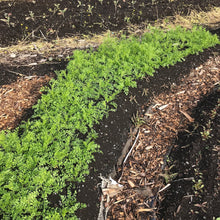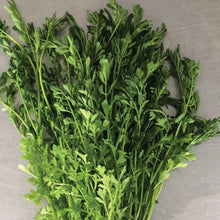Lepidium sativum
300 seeds
Maturity: 30 days
Grown by farmers at FIG, the Fresh International Garden at Grow North Farm run by RAIS, the Refugee Assistance and Immigration Services of Catholic Social Services Alaska in Anchorage, AK.
Brought to the farm by their Nepali farmers who have been growing and saving the seed for years, this Garden Cress is known as Chamsur in Nepali, Rashad in Arabic, Chandrashoor in India, and many other names around the world. Native to Egypt and Middle East and cultivated in Persia around 400 BCE, Garden Cress spread many centuries ago to western Europe where it is more common than in the USA where it is starting to take hold.
Chamsur's cold-hardy greens grow quickly and can easily be planted throughout the growing season for multiple harvests. Tender shoots are harvested 1-2 weeks after planting at 2-5" tall and the fast growing greens will mature in 20-30 days, quickly bolting after maturity. The beautiful feathery greens have a bright, tangy flavor similar to watercress or a mild mustard green that is delicious mixed into salads, on sandwiches, or cooked in soups.
Traditionally grown for its seed, Chamsur seeds are ground into a powder and mixed with water to drink or used as a peppery spice over cooked greens or rice. The seeds are often used to treat respiratory ailments and are used in traditional Ayurvedic medicine. Will self-seed readily for next year's planting or your winter spice cabinet.
We are also excited to be carrying the cookbook, Berbere and Beets: Recipes from Alaska's Refugee Community, written by RAIS.




